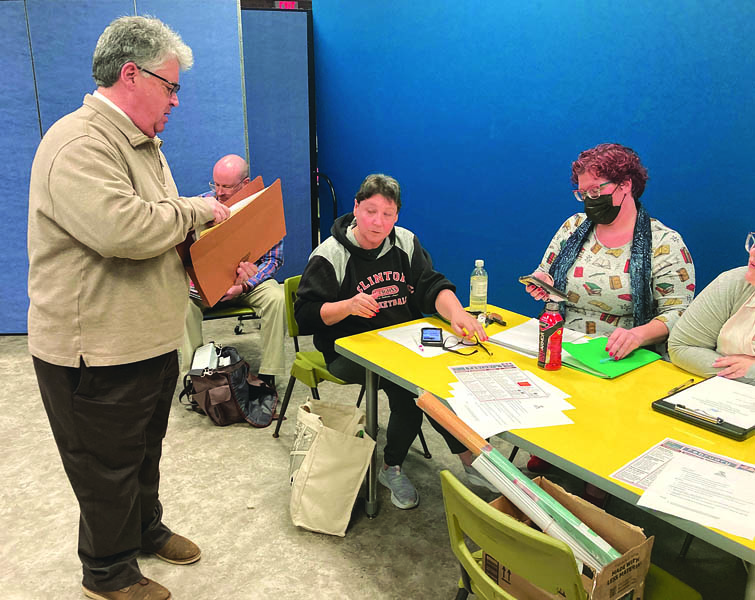Keeping the books
Clinton Library will not ‘segregate’ three contested works

Anderson County Law Director Jay Yeager talks to, from left, Rocky Top Public Library Director Kelly Harris and Clinton Public Library Director Miria Webb before an Anderson County Library Board meeting Thursday, Feb. 9. (photo:Ben Pounds )
After citizen complaints at a previous meeting, Anderson County Law Director Jay Yeager went through each of the books and said none of them were legally classified as “obscene.”
However, he recommended putting them in a section where children could not reach them as easily.
Clinton Public Library Director Miria Webb said she opposed that idea. The discussion took place during an Anderson County Library Board meeting at Clinton Public Library on Thursday, Feb. 9.
The books in question are all classified as for children by the library’s online catalogue. They are “Grandad’s Camper” by Harry Woodgate, “It Feels Good to be Yourself: A Book About Gender Identity” by Theresa Thorn, and “Families like Mine” by Marie-Therese Miller.
“Grandad’s Camper” is a fictional story that mentions a same-sex couple.
“It Feels Good to Be Yourself” discusses gender identity.
“Some people are boys. Some people are girls. Some people are both, neither or somewhere in between,” its description in the Clinton Public Library’s online catalog states.
“Families like Mine” discusses different types of families.
Yeager said Tennessee law and federal court decisions restrict library books based on whether they have “obscene” characteristics. Before the meeting, Amy Poteet of the Childhood Advocates Book Review Club, which meets at the Alliance Church of Oak Ridge, shared an email from Tennessee Rep. John Ragan, R-Oak Ridge, which quoted Tennessee Code Annotated 39-17-901. To qualify as “obscene” a book needs to meet the following criteria which Ragan and Yeager listed.
• “The average person, applying community standards would find that the work, taken as a whole, appeals to the prurient interest.
• “The average person applying contemporary community standards would find that the work depicts or describes, in a patently offensive way, sexual conduct; and
• “The work, taken as a whole lacks serious literary, artistic, political, or scientific value.”
Yeager, speaking to the board, however, said none of the three books his office investigated were obscene under these criteria. He said these standards can be subjective.
“It depends on community standards,” he said. “It depends on how you’ve been raised.”
He also said the laws may change and his analysis of the law isn’t the same as his view on whether the books are moral or not.
Yeager spoke in favor of putting the books in a different place with “other like-content and age-appropriate material and not at the front entrance of the library or on a low shelf or table.”
Clinton Library Director Miria Webb, however, said she did not plan to move the books.
Poteet was among the Anderson County residents who spoke at the meeting. She, like Yeager, wanted the library to put the books in a special section.
“We’re not asking you to burn the books. We’re not asking you to take them out of the library. We’re just asking for a little segregation,” she said.
“I’m not segregating our gay and lesbian and transgender people out of our collection,” Webb said in response.
“They’re just asking for a little movement,” Poteet said. “A little place to put those books that are different from the Christian books. I don’t see the Bible out here. I’m sure you have it somewhere,” she said.
At that point, Webb left the meeting room. She later returned with a stack of Bibles which she had gathered from the library shelves.
“I don’t want to create any additional restrictions on our books,” Webb said after the meeting.

